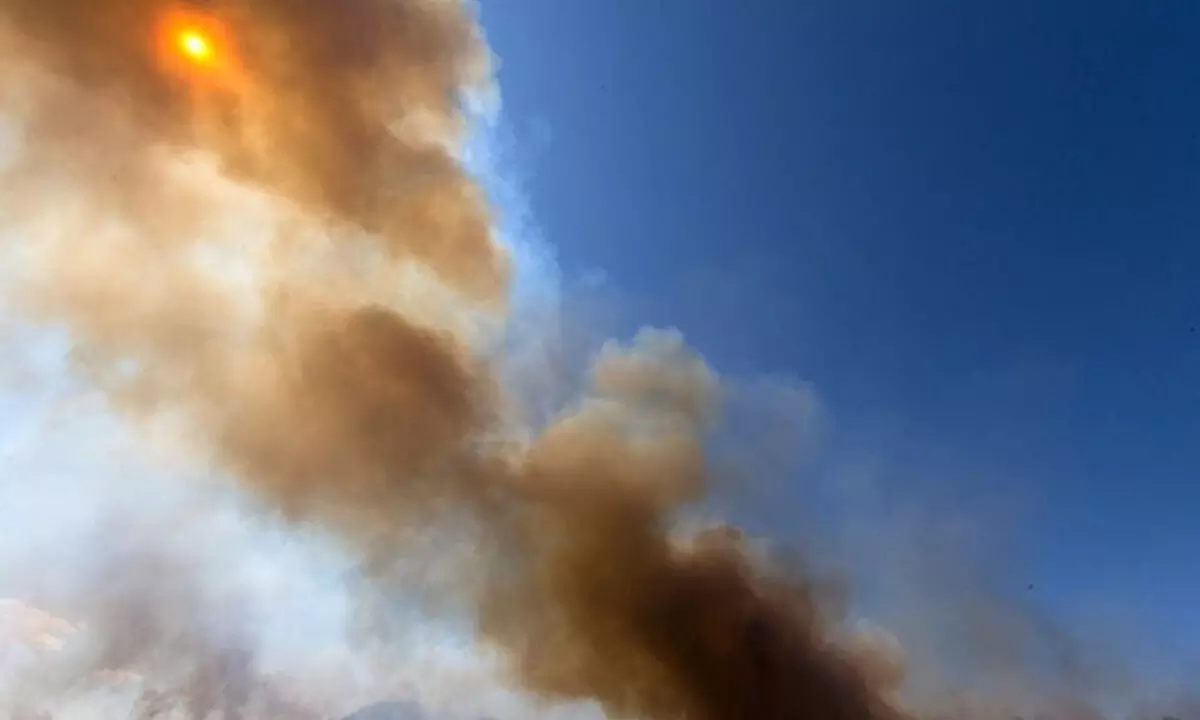Wildfires in Canada continue to pose challenges
Share :

The ongoing wildfire crisis in Canada has reached unprecedented proportions, with officials warning that the raging fires have shown no sign of abating in September as well.
Ottawa: The ongoing wildfire crisis in Canada has reached unprecedented proportions, with officials warning that the raging fires have shown no sign of abating in September as well.
Providing the national update on this year's fire season through a press conference on Thursday, the federal authorities of Canada stated that the country witnessed 6,174 wildfires, two of which have exceeded one million hectares, reports Xinhua news agency.
As per the data made public by the Canadian Interagency Forest Fire Centre, nearly 1,000 wildfires are raging across the country to date, with more than 600 designated as out-of-control.
A top official at Natural Resources Canada said there is potential for increased wildland fire activity across Central Canada, from the eastern half of the province of Alberta to Ontario.
"This is largely in alignment with last month's forecast, which anticipated that the potential area at extreme risk would include southern British Columbia, the Prairies, part of Northwest Territories, and western Ontario," Michael Martin, director general at Natural Resources Canada, said at the press conference.
In recent months, raging wildfires threatened the country's critical infrastructures while forcing the authorities to issue over 200 evacuation orders.
In August, Prime Minister Justin Trudeau convened an emergency meeting to discuss the wildfire crisis in the Northwest Territories.
"Wildfires led to 284 evacuation orders while prompting a total of 232,209 Canadian evacuees in this season," Martin further said, adding that despite the arrival of cooler night temperatures and decreasing lightning activity in the fall, ongoing warm and dry conditions may contribute to new fire starts.
"Some of the newer fires will continue to be active throughout September and possibly later into autumn," he warned.
During this season, the wildfires predominantly raged throughout the province of Quebec, with 5.3 million hectares burned; Northwest Territories 3.6 million hectares; Alberta 2.3 million hectares; B.C. 1.9 million hectares; and Nova Scotia 25,000 hectares, according to details provided by officials based on data collected through satellite hotspots.
Federal authorities said they have continuously mobilized resources across the country for recovery and rebuilding amid growing calls for a national wildfire fighting force, more aid for evacuees and financial help to rebuild.
As of early September, 4,714 firefighting personnel have been deployed to battle the wildland fires, according to official figures.
During the press conference, Harjit Sajjan, president of the King's Privy Council for Canada and minister of emergency preparedness, shed light on the previously announced funding while providing brief details about recently greenlit Canadian government programs.
"The last few weeks have been extremely difficult for Canadians. Community members have been forced to leave their homes, not knowing if their homes will still be there when they return," he added.
"Thankfully, in Yellowknife, thousands of people are beginning to return home after three long weeks. We continue to mobilize resources across the country, and we will be there throughout the recovery."
Meanwhile, the Canadian economy has been impacted by the wildfires.
In its latest projection on Wednesday, the Bank of Canada said that its target for the benchmark interest rate stood at 5 per cent.
Economic growth slowed sharply in the second quarter of 2023, with output contracting by 0.2 per cent at an annualised rate, reflecting a marked weakening in consumption growth, a decline in housing activity and the impact of wildfires in many regions of the country, the bank said.
Last week, Statistics Canada said that the country's real gross domestic product by industry was essentially unchanged in the second quarter of 2023 after seven quarters of growth.
Growing drought and wildfires in many regions of the country contributed to lower crop production in the quarter as the yield outlook for the year declined.
















